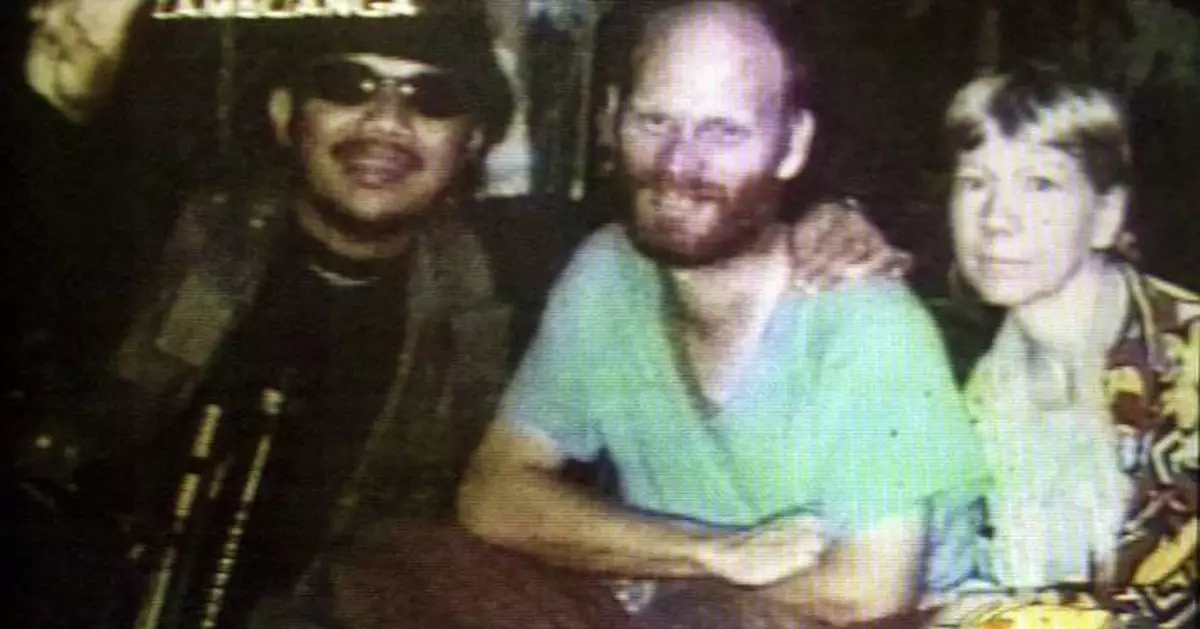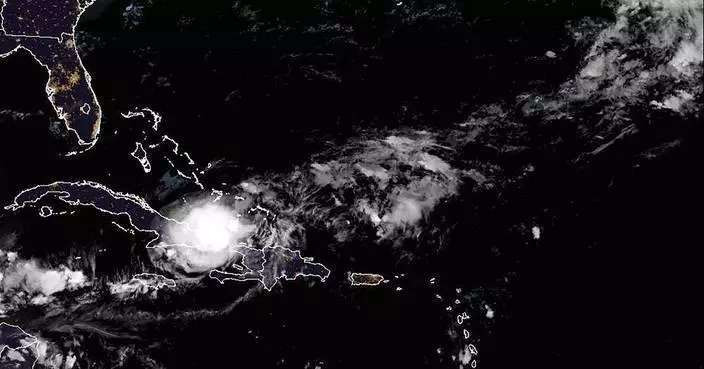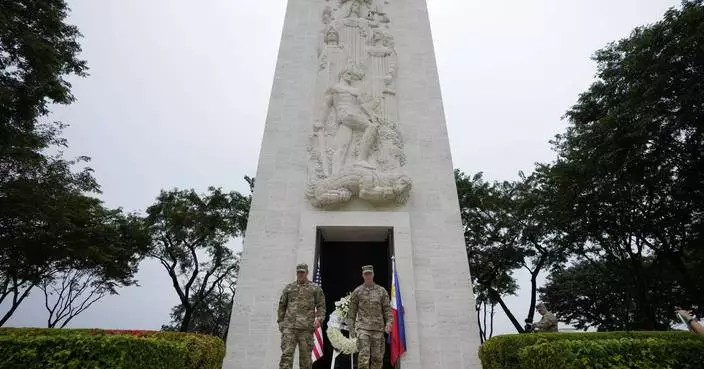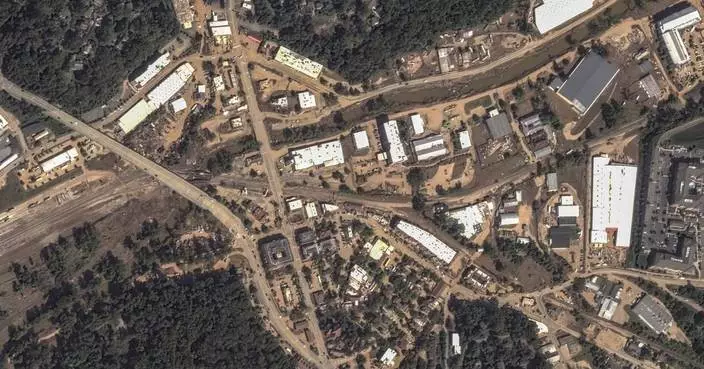MANILA, Philippines (AP) — A Philippine court has convicted and sentenced to life 17 Islamic militants for kidnapping for ransom 21 people, including European tourists and Asian workers, from a dive resort in Malaysia more than two decades ago, officials said Monday.
The Filipino militants belonged to the small but violent Abu Sayyaf group.
Among those convicted by the Regional Trial Court in Taguig city, a suburb of the capital region, were two Abu Sayyaf leaders, Hilarion Santos and Redendo Dellosa, who had been included in a United Nations terrorism blacklist, the Department of Justice in Manila said.
The 17 were sentenced to life in prison with the possibility of pardon after 30 years, according to justice officials.
In April 2000, Abu Sayyaf militants armed with assault rifles and machetes, traveled by speedboats from their southern Philippine jungle strongholds and raided the Sipadan Island dive resort in neighboring Malaysia, where they abducted 21 Western tourists and resort workers at gunpoint.
The militants are an offshoot of the decades-long Muslim separatist unrest in the southern Philippines, homeland of minority Muslims in the largely Roman Catholic nation. The Philippines and the United States both consider the Abu Sayyaf a terrorist organization.
The militants carried out bombings, ransom kidnappings and beheadings during their heyday starting in the late 1990s, but they have been weakened considerably by battle defeats, surrenders and infighting.
The hostages consisted of a German family of three, two tourists from Finland, a South African couple, a Lebanese woman and two French citizens. The rest were Malaysians and Filipinos who worked in the far-flung resort.
They were taken by speedboats to the jungles of the southern Philippine province of Sulu, where they were held in harsh conditions before being mostly ransomed off using millions of dollars reportedly provided by then-Libyan leader Moammar Gadhafi.
Two Associated Press journalists, who were allowed by the Abu Sayyaf to interview the hostages while they were in jungle captivity at the time, saw most of the horrified captives sitting on banana leaves laid on the ground and surrounded by a fence of tree branches. Some rapidly scribbled letters and begged their families and embassies to send them food, water, medicine and find ways to free them.
After the hostages were freed, the Philippine military launched offensives that lasted several years and resulted in the killing or capture of most of Abu Sayyaf leaders and fighters.
Ghalib Andang, the militant who led the kidnapping, was killed by police commandos during an attempted jailbreak and siege in a high-security detention center in 2005 in metropolitan Manila.
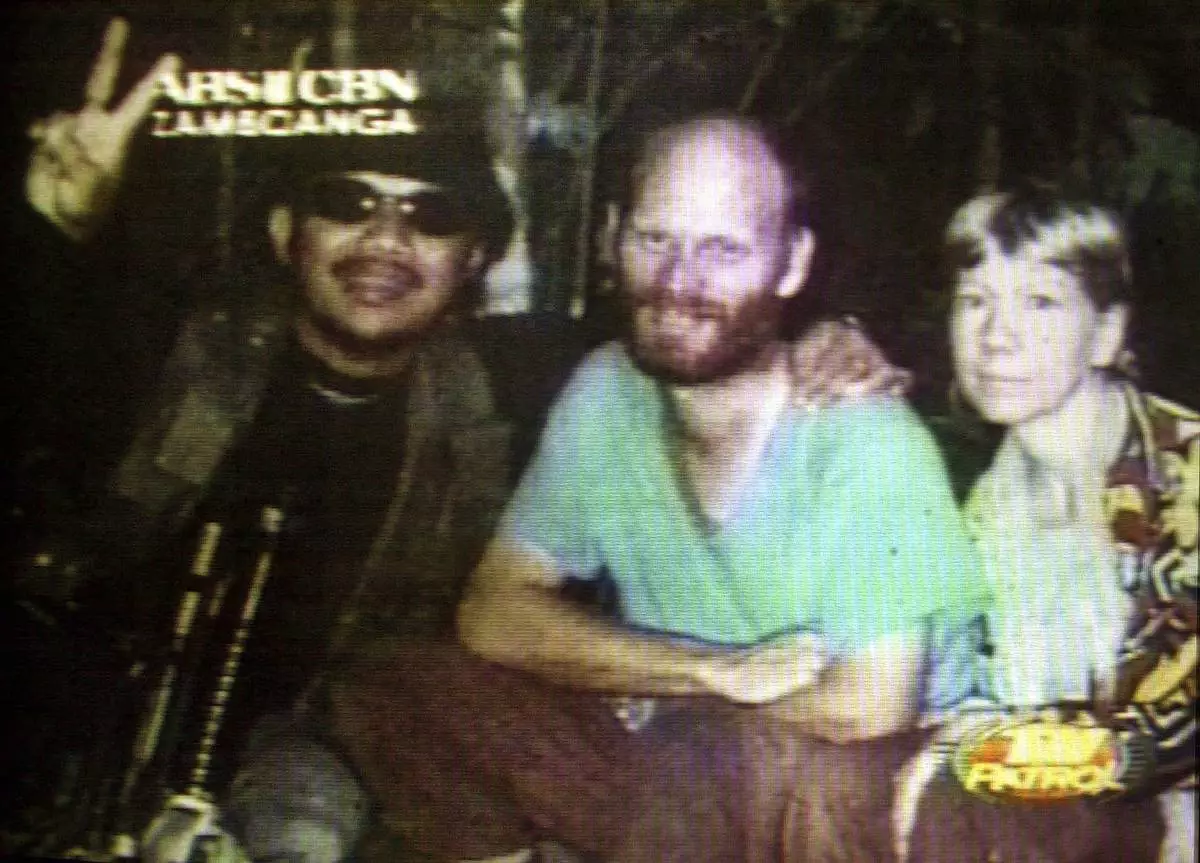
Kidnapped American missionaries Martin, center, and Gracia Burnham, right, who were kidnapped from a Philippines resort eight months ago, are seen beside their abductor Abu Sabaya, leader of the Muslim extremist group the Abu Sayyaf in this undated photo made from video, originally a still photo, released on Oct. 10, 2001. (ABS CBN via AP, file)
The Israeli military apologized Monday for a strike that killed three Lebanese soldiers in southern Lebanon, saying it is not battling the country's military and its troops believed they were targeting a vehicle belonging to the Hezbollah militant group.
Israeli strikes meanwhile hit nearly a dozen branches of a Hezbollah-run financial institution that Israel says is used to fund attacks but where many ordinary people keep their savings.
Last week, Hezbollah said it is entering a new phase in its fight against invading Israeli troops, as the region reckoned with the killing of top Hamas leader Yahya Sinwar in a battle with Israeli forces in Gaza. Sinwar was a chief architect of the attack on southern Israel that precipitated the latest escalating conflicts in the Middle East.
Israeli Prime Minister Benjamin Netanyahu has pledged to annihilate Hamas and recover dozens of hostages held by the group. Hamas says it will only release the captives in return for a lasting cease-fire, a full Israeli withdrawal from Gaza and the release of Palestinian prisoners.
On Oct. 7, 2023, Hamas-led militants blew holes in Israel’s security fence and stormed in, killing some 1,200 people, mostly civilians, and abducting another 250. Israel’s offensive in Gaza has killed over 42,000 Palestinians, according to local health authorities, who do not distinguish combatants from civilians. The war has destroyed large areas of Gaza and displaced about 90% of its population of 2.3 million people.
Here's the latest:
Overnight strikes by Israel hit at least 15 branches of a Hezbollah-run financial institution in Lebanon.
The strikes targeted Al-Qard Al-Hassan branches in the southern suburbs of Beirut, across southern Lebanon and in the eastern Bekaa Valley, where Hezbollah has a strong presence.
Israel says the bank is used to fund attacks. But it is also where many ordinary Lebanese keep their savings.
The Israeli military issued evacuation warnings ahead of the strikes. There were no reports of casualties.
One of the strikes in the Beirut suburbs was not far from the Lebanese General Security building. Another rocket landed on a road near Lebanon's only international airport.
TEL AVIV, Israel — Hundreds of right-wing and ultranationalist Israelis took part Monday in a conference about reestablishing Jewish settlements in the Gaza Strip.
The conference, held close to the Gaza border, attracted numerous prominent parliamentarians, including from Netanyahu’s Likud party.
Since the start of the Israel-Hamas war, the Gaza resettlement movement has crept from the extreme fringes of Israeli society into political discourse among Prime Minister Benjamin Netanyahu’s right-wing coalition partners.
Netanyahu has publicly dismissed the idea or Jewish settlements in Gaza. The military forcibly evacuated Jewish settlements from Gaza in 2005, a move that bred resentment toward the state among many of the settlers who now seek to return.
Mourners attending the funeral of a man killed in a rocket attack in northern Israel over the weekend were forced to take cover Monday as sirens wailed and more rockets were fired from Lebanon.
The mourners of Alexei Poupov were seen taking cover alongside gravestones as loud explosions and interceptions followed.
Poupov was killed Saturday in a rocket attack on the northern city of Acre.
TEHRAN — Iran says it has sent a note of protest to the U.N. nuclear watchdog agency over the possibility of an Israeli strike against its nuclear facilities.
Esmail Baghaei, spokesman for Iran's foreign ministry, said Monday that the protest note was sent to the director of the International Atomic Energy Agency, or IAEA.
Baghaei said Iran would consider an attack on any such facilities "a threat against international peace and security.”
Israel has vowed to respond to an Iranian ballistic missile attack earlier this month, raising fears of strikes on Iran’s nuclear sites.
Israel has a broad range of choices of targets – from Iranian government buildings and military bases to sensitive oil installations to heavily fortified nuclear facilities hidden deep below ground.
Iran has repeatedly denied that it is seeking to develop nuclear weapons.
BEIRUT — Lebanese police stormed an abandoned building in Beirut’s commercial district, Hamra, to evict hundreds of displaced by Israel’s war on Hezbollah, who have been squatting there for weeks.
Lebanese authorities have prepared hundreds of shelters to accommodate the displaced. But as their numbers climbed to nearly 20% of the population, or an estimated 1.2 million people, official shelters have not been able to cope.
Tens of thousands had fled their homes since last year. An Israeli escalation last month has driven out an additional hundreds of thousands of people from the south, Bekaa and the southern suburbs of Beirut, many of them often fleeing with nothing more than the clothes they are wearing.
Most of the formal shelters prepared by the government are at full capacity, housing nearly 200,000 people.
Most of the displaced have sought accommodation with relatives and friends around Lebanon. But many have taken to beaches and open spaces, where they set up shelters. With winter approaching, they are seeking a roof over their head.
Scuffles broke out Monday between police and many of the displaced who refused to leave. An ambulance arrived to remove a person who passed out. A woman threatened to jump off the balcony if she was forced to leave, yelling she refused to go to overcrowded government shelters, where there is no space and where she feared diseases.
It was not clear what prompted the sudden eviction. Lebanon’s Interior Ministry said it will not allow trespassing on private property despite the displacement crisis.
CAIRO — Palestinian medical officials say they have collected over a dozen bodies of people killed in Israel’s ongoing air and ground operation in northern Gaza.
The Gaza Health Ministry’s emergency service said they included six men killed early Monday when they were trying to get drinking water in the urban Jabaliya refugee camp, the main focus of the operation.
Four others, including two women, were killed in a strike on an area sheltering displaced people in Jabaliya, it said. Another three people were killed in a strike on a school-turned-shelter in the border town of Beit Hanoun.
Dr. Hossam Abu Safiyya, the director of the nearby Kamal Adwan Hospital, said it was overwhelmed with wounded people and patients.
Israel launched the operation more than two weeks ago, saying Hamas militants had regrouped in Jabaliya after several previous military operations there. The military says it tries to avoid harming civilians.
Israeli authorities have dramatically reduced the amount of aid allowed into Gaza, raising fears among Palestinians that they are implementing a surrender-or-starve plan advocated by retired Israeli generals.
Israel ordered the entire population of the northern third of Gaza, including Gaza City, to evacuate to the south in the war’s opening weeks and reiterated those instructions this month. Around 400,000 people are believed to have remained in the north, which is encircled by Israeli forces and off limits to Palestinians who fled their homes there.
JERUSALEM — Israeli police have arrested seven citizens who they say were paid by Iran to collect intelligence for over two years.
In a statement released Monday, Israel’s internal security agency and police said that the seven collected information about other Israelis and photographed Israeli military installations, including missile defense systems, air force and naval sites, and power plants.
Iran paid them paid hundreds of thousands of dollars, often in cryptocurrency, the statement said. It did not provide evidence for the alleged plot.
Israeli authorities say they have foiled several recent plots by Iran that involved recruiting Israelis for espionage or assassinations.
Israel has vowed to retaliate for Iran’s Oct. 1 ballistic missile attack. Israeli air defenses shot down most of the missiles, but some hit Israeli military installations.
Israel and Iran have waged a shadow war for years that burst to the surface after Hamas’ Oct. 7, 2023, attack triggered the war in Gaza. Israel and Iran exchanged fire directly for the first time in April.
Iran supports armed groups across the region, including Hamas in Gaza and Hezbollah in Lebanon.
PARIS — French President Emmanuel Macron called once again for a cease-fire in Gaza and Lebanon in a phone call with Israeli Prime Minister Benjamin Netanyahu on Monday, the Elysee Palace said in a statement.
Macron said the elimination of Hamas’ top leader Yahya Sinwar last week in Gaza “must be an opportunity to begin a new phase of negotiation” for a cease-fire, the release of hostages and the entry of humanitarian aid into Gaza.
Macron alo called for Israel to preserve infrastructure and protect civilians in Lebanon.
Macron shared his intention to keep communication channels open with Teheran, “to obtain guarantees on Iran’s nuclear program, ballistic program and regional policy,” the statement.
Relations between the two leaders became tense recently after Macron called for “a halt to arms exports for use in Gaza,” drawing strong criticism from Netanyahu.
CAIRO — The head of Israel’s internal security agency has visited Cairo to discuss reviving Gaza cease-fire talks after the killing of Hamas leader Yahya Sinwar, officials said.
Israel and Hamas, as well as Egypt, which has served as a key mediator, appear to still be divided over whether Israel would retain control over parts of Gaza, a dispute that dragged the talks to a halt in August.
An Egyptian official said Ronen Bar, the head of Israel’s Shin Bet security agency, held an hourslong meeting Sunday with Egypt’s newly appointed intelligence chief, Hassan Mahmoud Rashad.
An Israeli official also confirmed the visit, speaking on condition of anonymity because it was not publicized. The visit was widely reported by Israeli media.
The Egyptian official, who was not authorized to brief media and spoke on condition of anonymity, said they discussed the possibility of reviving the negotiations after the death of Sinwar, who was killed in an Israeli military operation last week.
The official said Egypt is still opposed to any Israeli presence in a strip of land running the length of the Gaza side of the territory’s border with Egypt, and that Hamas is unlikely to lift its demand for a full Israeli withdrawal from Gaza.
Hamas has said its demands for a lasting cease-fire, Israel’s full withdrawal from Gaza and the release of a large number of Palestinian prisoners in return for dozens of hostages held in Gaza for over a year have not changed following Sinwar’s death.
Bar also visited Egypt last Tuesday, before Sinwar’s death.
— By Samy Magdy in Cairo and Julia Frankel in Jerusalem
BEIRUT — Lebanon’s caretaker prime minister says implementing a nearly 2-decade-old U.N. resolution still offers the best path to ending the Israel-Hezbollah war.
In an interview with the Al-Arabiya network broadcast Monday, ahead of the arrival of a U.S. envoy, Najib Mikati said a new resolution appeared unlikely.
“There is no solution but a diplomatic solution, and the diplomatic solution is currently on the table,” he said.
U.N. Security Council Resolution 1701, which ended the 2006 Israel-Hezbollah war, called for Hezbollah to withdraw from the border and for U.N. peacekeepers and the Lebanese army to control southern Lebanon, without any Hezbollah or Israeli presence.
Israel says the resolution was never implemented and that Hezbollah built up extensive military infrastructure right up to the border. Lebanon has long accused Israel of violating its airspace and failing to abide by other provisions of the resolution.
U.S. envoy Amos Hochstein, who was in Beirut on Monday, said U.N. resolution 1701 is “no longer enough” and a new mechanism must be put in place to ensure it is implemented “fairly, accurately, transparently.”
“1701 was successful at ending the war in 2006, but we must be honest that nobody did anything to implement it,” Hochstein said in a news conference after meeting with Berri. “The lack of implementation over those years contributed to the conflict that we are in today.”
Hezbollah, which said it would continue attacks on Israel until there is a cease-fire in Gaza, appears to have softened that position in recent weeks as Israeli strikes have eliminated much of its top leadership and pounded large areas of Lebanon.
Hezbollah now says it supports the diplomatic efforts of Mikati and Lebanese Parliament Speaker Nabih Berri, a political ally of the militant group. Both Lebanese leaders have said they are no longer seeking to tie a cease-fire in Lebanon to one in Gaza.
JERUSALEM — The Israeli military has apologized for a strike in southern Lebanon that killed three Lebanese soldiers.
The military said it struck a truck on Sunday that had entered an area where it had previously targeted a Hezbollah truck transporting a launcher and missiles.
The military said soldiers were not aware that the second truck belonged to the Lebanese army.
The military said it is “not operating against the Lebanese Army and apologizes for these unwanted circumstances.”
Lebanon’s army is a respected institution within the country, but it is not powerful enough to impose its will on Hezbollah or defend Lebanon from Israel’s invasion. The army has largely kept to the sidelines as Israel and Hezbollah have traded blows over the past year.
Israeli forces invaded southern Lebanon at the beginning of the month and have been operating in a narrow strip along the border. Israeli airstrikes have pounded large areas of the country, targeting what Israel says are Hezbollah sites.
The militant group has fired thousands of rockets, missiles and drones into Israel since Oct. 8, 2023, the day after its ally Hamas launched a surprise attack into Israel, triggering the war in Gaza.
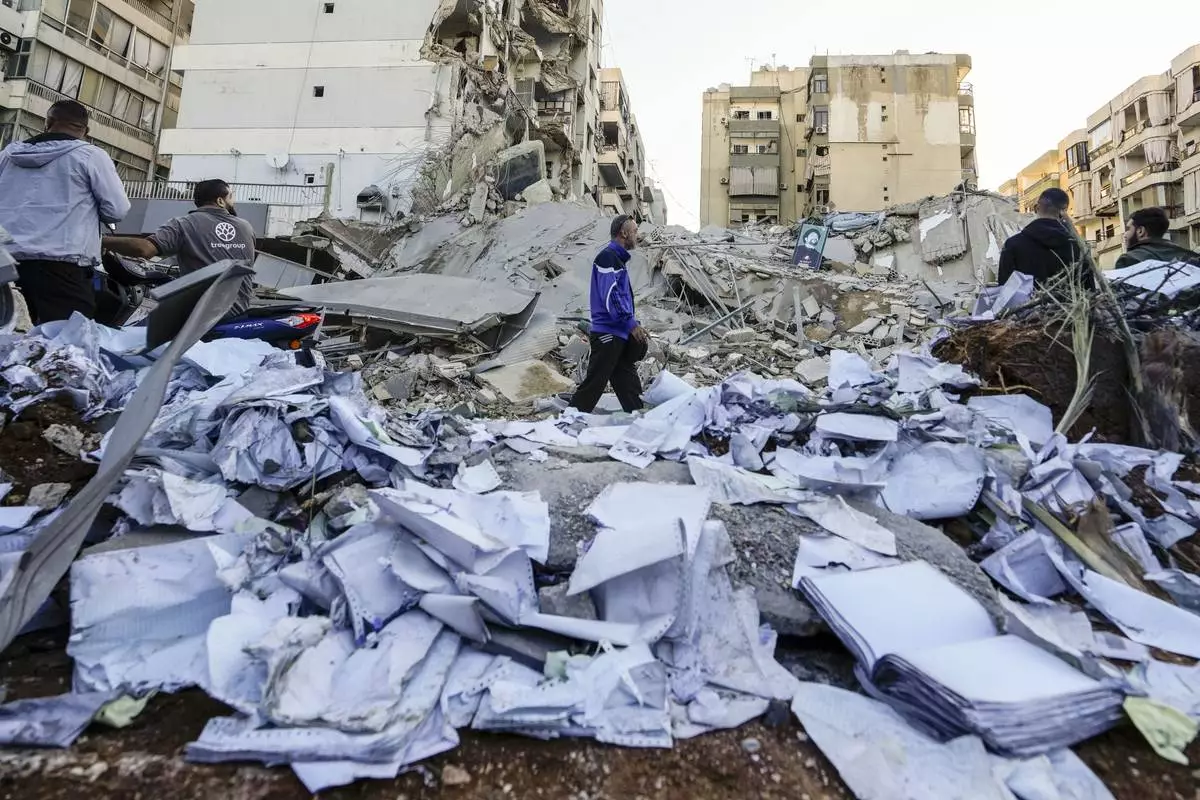
Documents of Hezbollah-run al-Qard al-Hassan are scattered at the site of an Israeli airstrike on Sunday night in Beirut's southern suburb, Lebanon, Monday, Oct. 21, 2024. (AP Photo/Hassan Ammar)
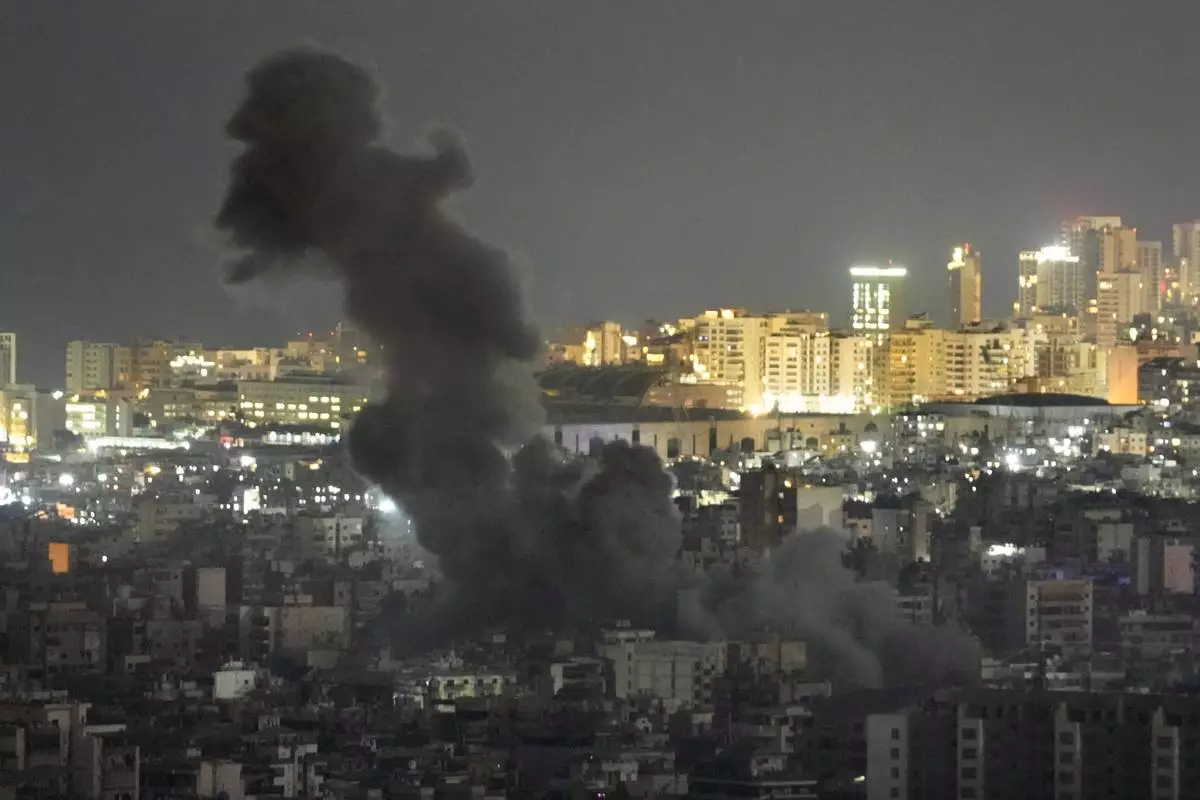
Smoke rise from an Israeli airstrike on Dahiyeh in the southern suburb of Beirut, as Beirut city seen in the background, Lebanon, Sunday, Oct. 20, 2024. (AP Photo/Hussein Malla)
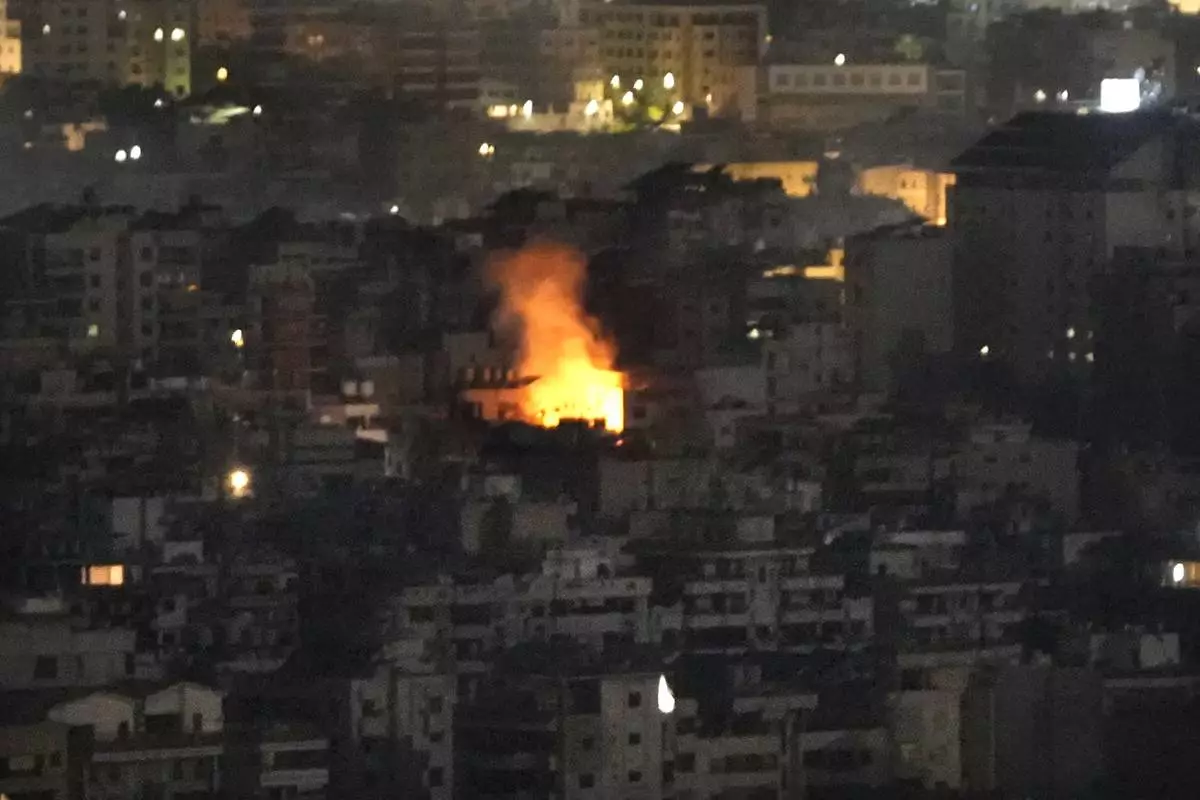
Flame rise from a building that was hit by an Israeli airstrike on Dahiyeh, in the southern suburb of Beirut, Lebanon, Sunday, Oct. 20, 2024. (AP Photo/Hussein Malla)
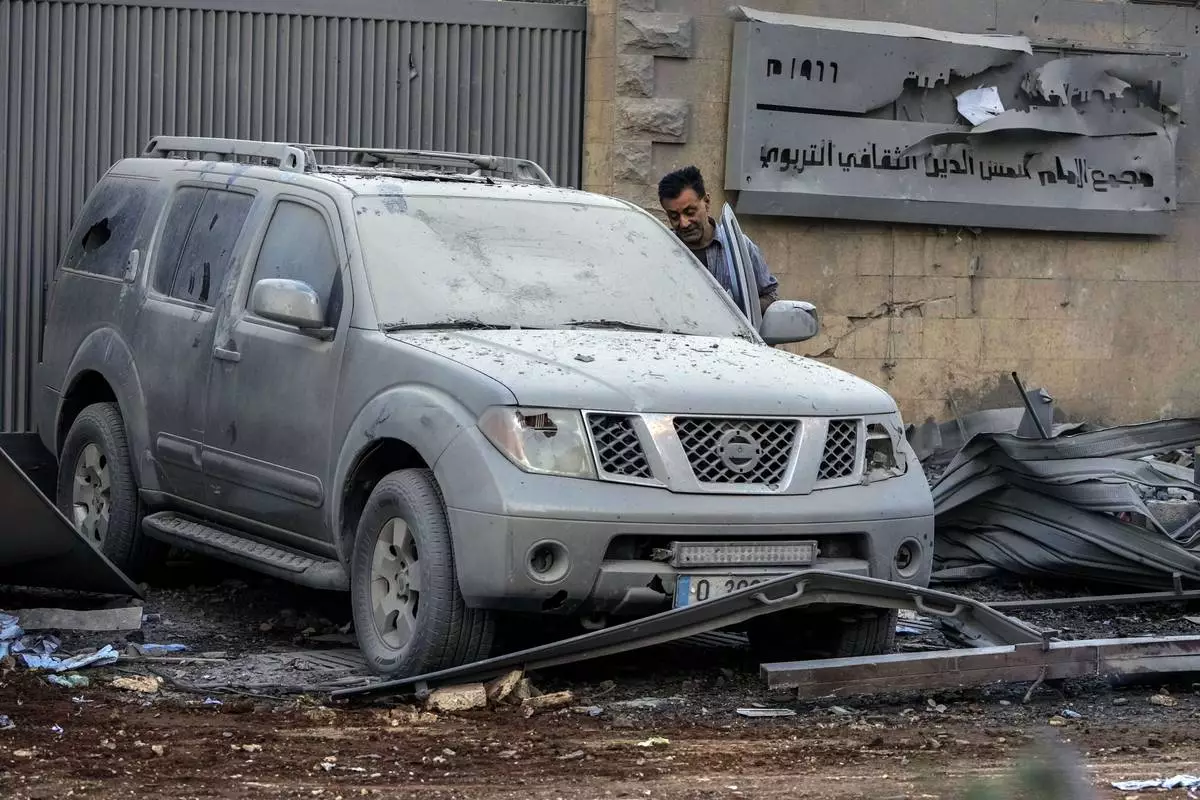
A man checks his destroyed car at the site of an Israeli airstrike that hit several branches of the Hezbollah-run al-Qard al-Hassan in Dahiyeh, Beirut, Lebanon, Monday, Oct. 21, 2024. (AP Photo/Hassan Ammar)
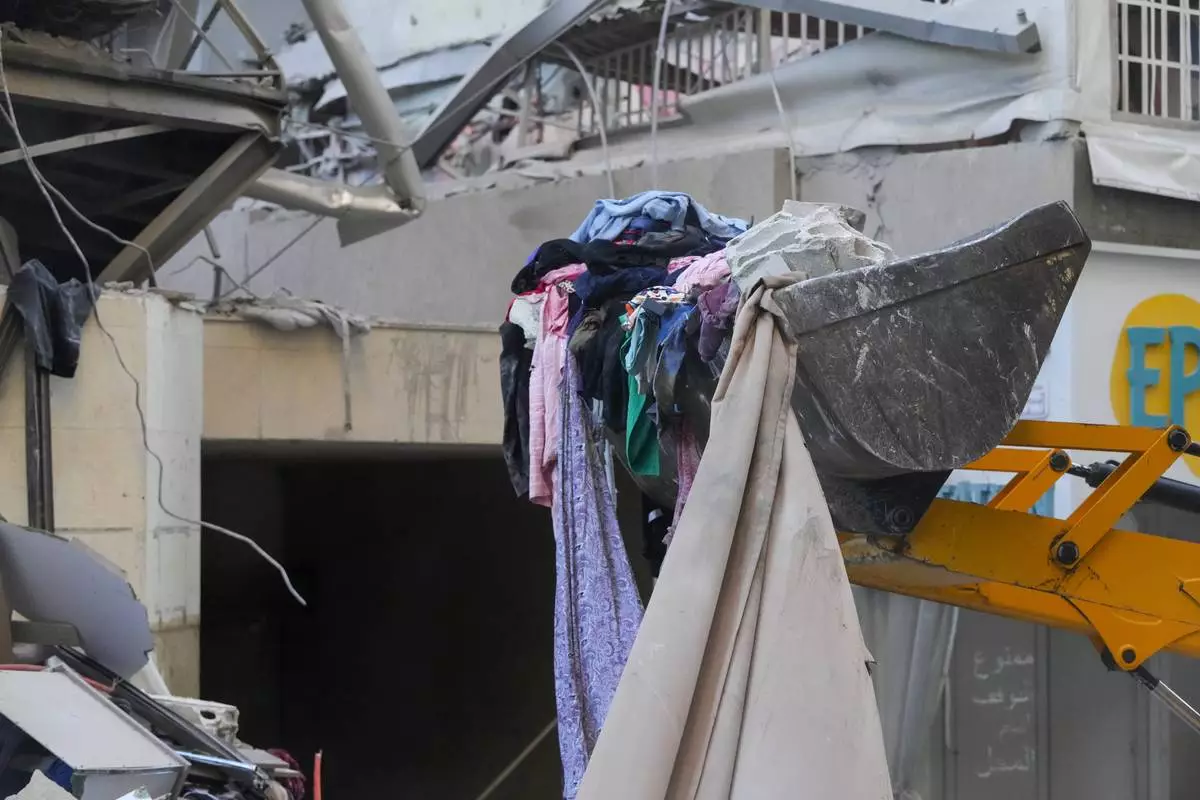
Rescue workers use a bulldozer to remove rubble of destroyed buildings at the site of an Israeli airstrike that hit several branches of the Hezbollah-run al-Qard al-Hassan in Dahiyeh, Beirut, Lebanon, Monday, Oct. 21, 2024. (AP Photo/Hassan Ammar)
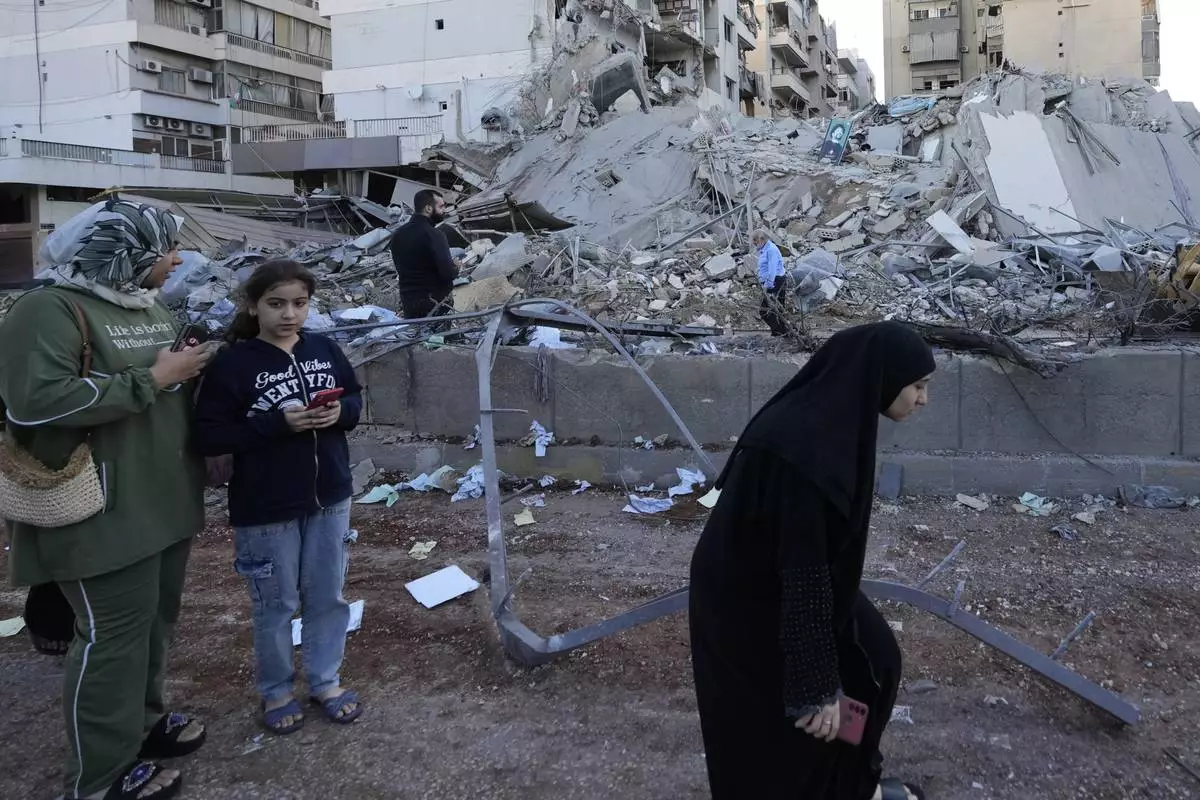
Residents check destroyed buildings at the site of an Israeli airstrike in Dahiyeh, Beirut, Lebanon, Monday, Oct. 21, 2024. (AP Photo/Hassan Ammar)
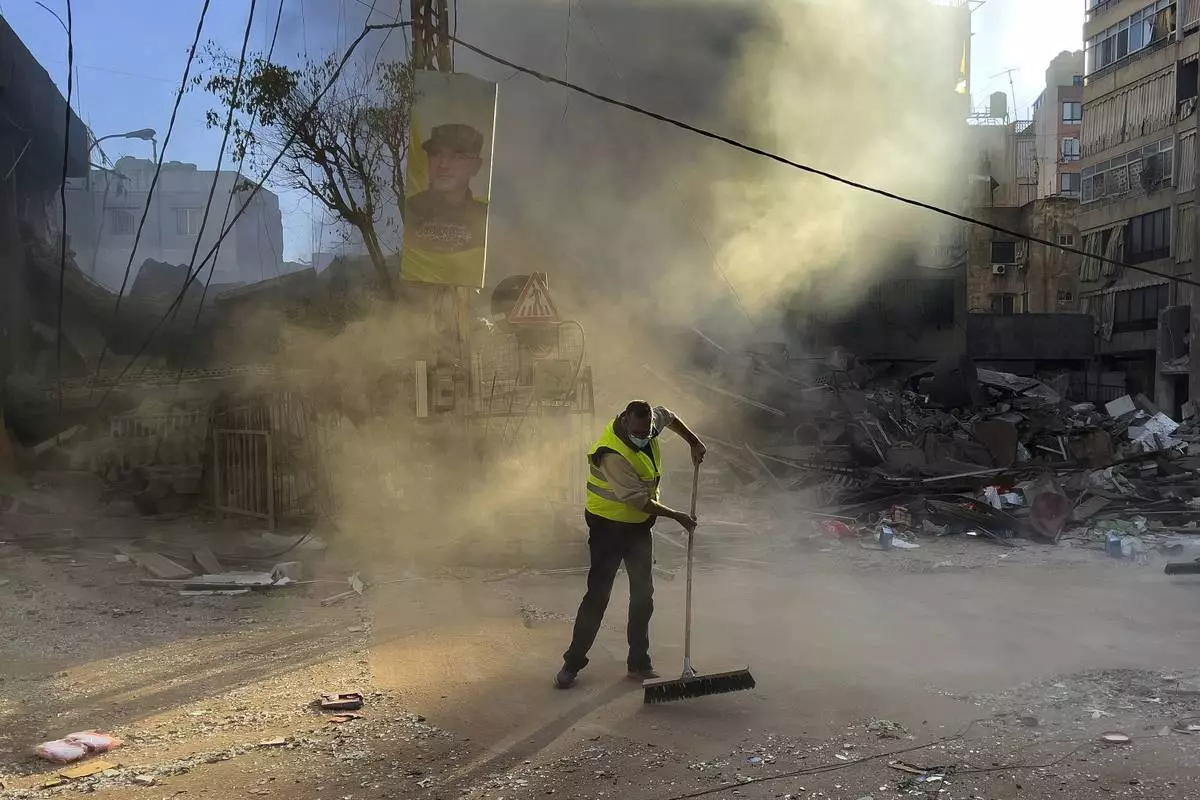
A worker cleans a street as smoke rises from a destroyed building that was hit by an Israeli airstrike in Dahiyeh, in the southern suburb of Beirut, Lebanon, early Sunday, Oct. 20, 2024. (AP Photo/Hussein Malla)
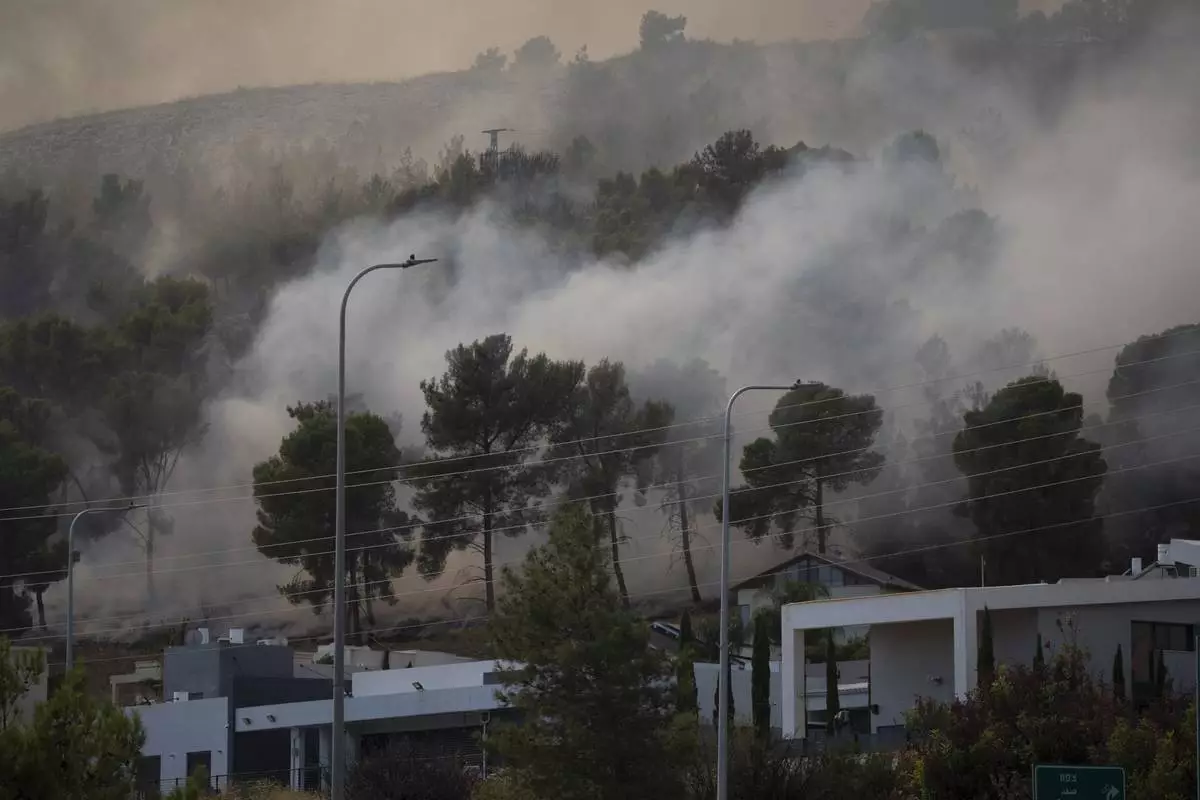
Smoke rises to the sky as fire burns in a site next to houses after a rocket, fired from Lebanon, hit a location near the town of Rosh Pinna, northern Israel, Sunday, Oct. 20, 2024. (AP Photo/Leo Correa)
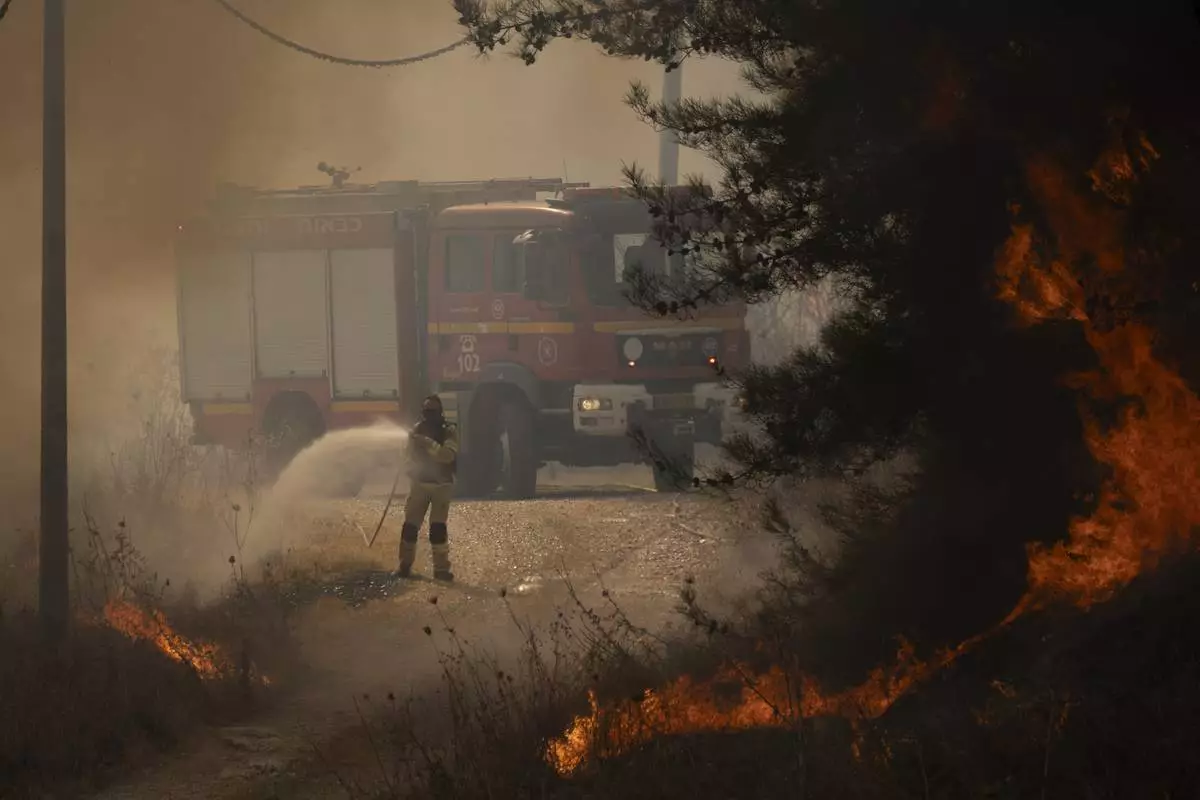
A firefighter works to extinguish a fire after a rocket, fired from Lebanon, hit an area near the town of Rosh Pinna, northern Israel, Sunday, Oct. 20, 2024. (AP Photo/Leo Correa)
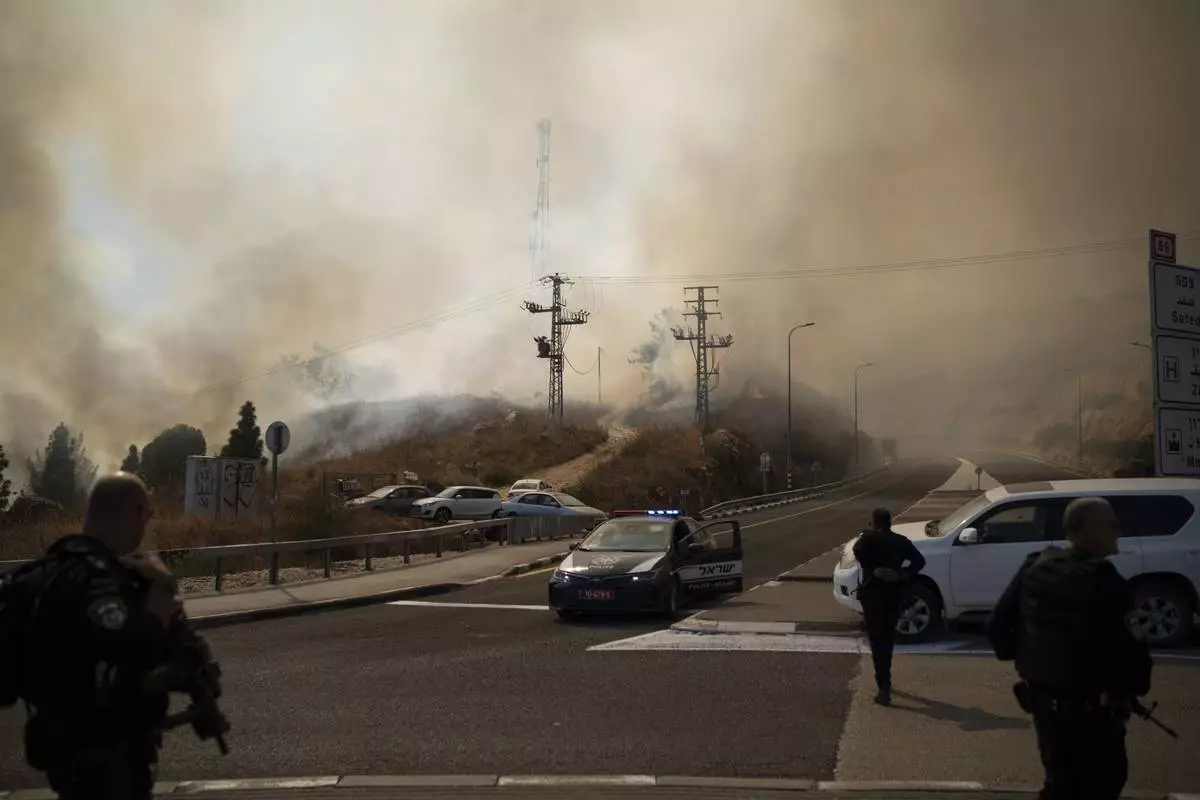
Israeli police officers stand next to a site of a fire after a rocket, fired from Lebanon, hit an area near the town of Rosh Pinna, northern Israel, Sunday, Oct. 20, 2024. (AP Photo/Leo Correa)
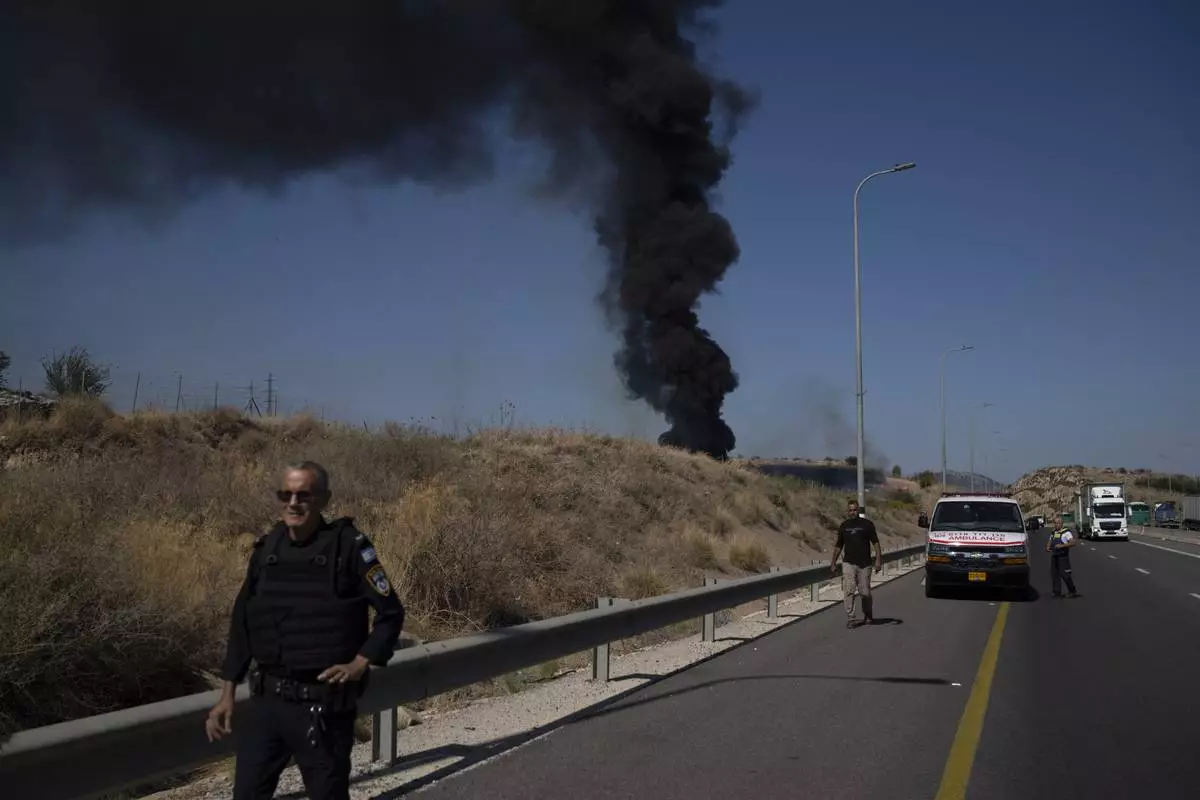
A Israeli police officer walks past site of a fire after a rocket, fired from Lebanon, hit an area near the town of Rosh Pinna, northern Israel, Sunday, Oct. 20, 2024. (AP Photo/Leo Correa)
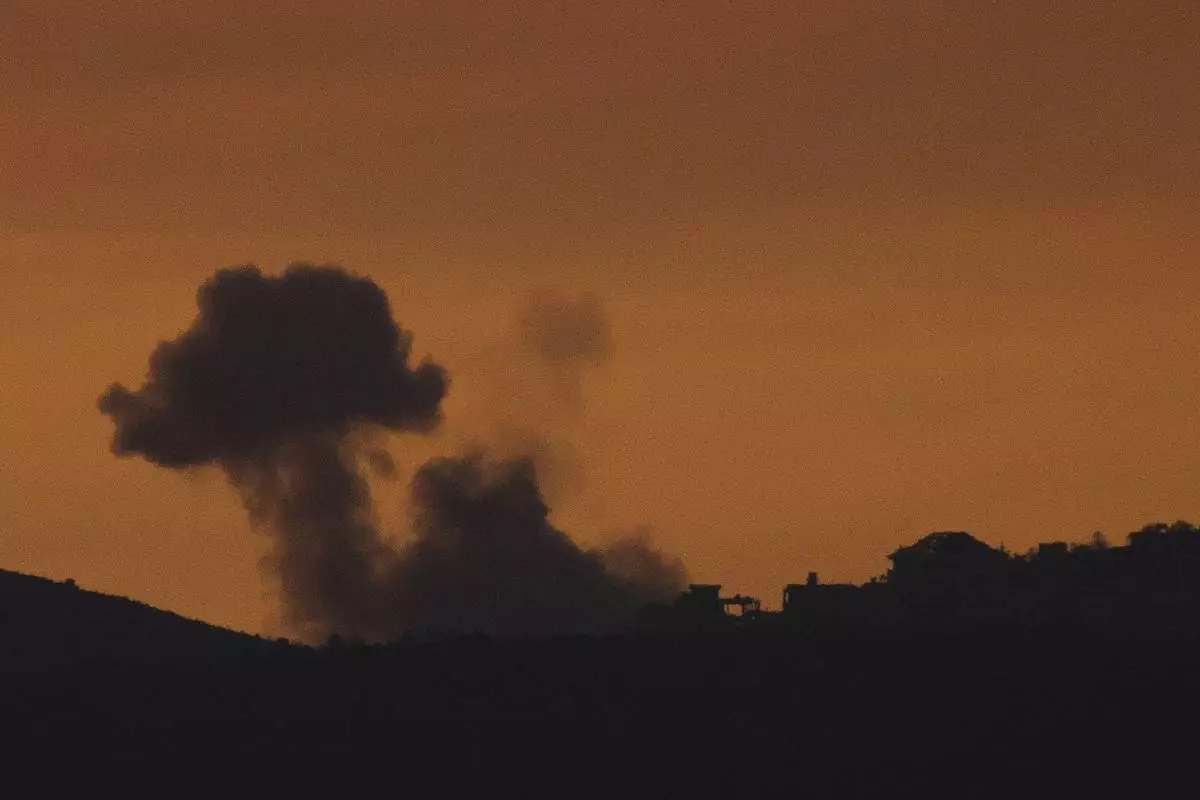
Smoke rises following an explosion in southern Lebanon as seen from northern Israel, Sunday, Oct. 20, 2024. (AP Photo/Leo Correa)
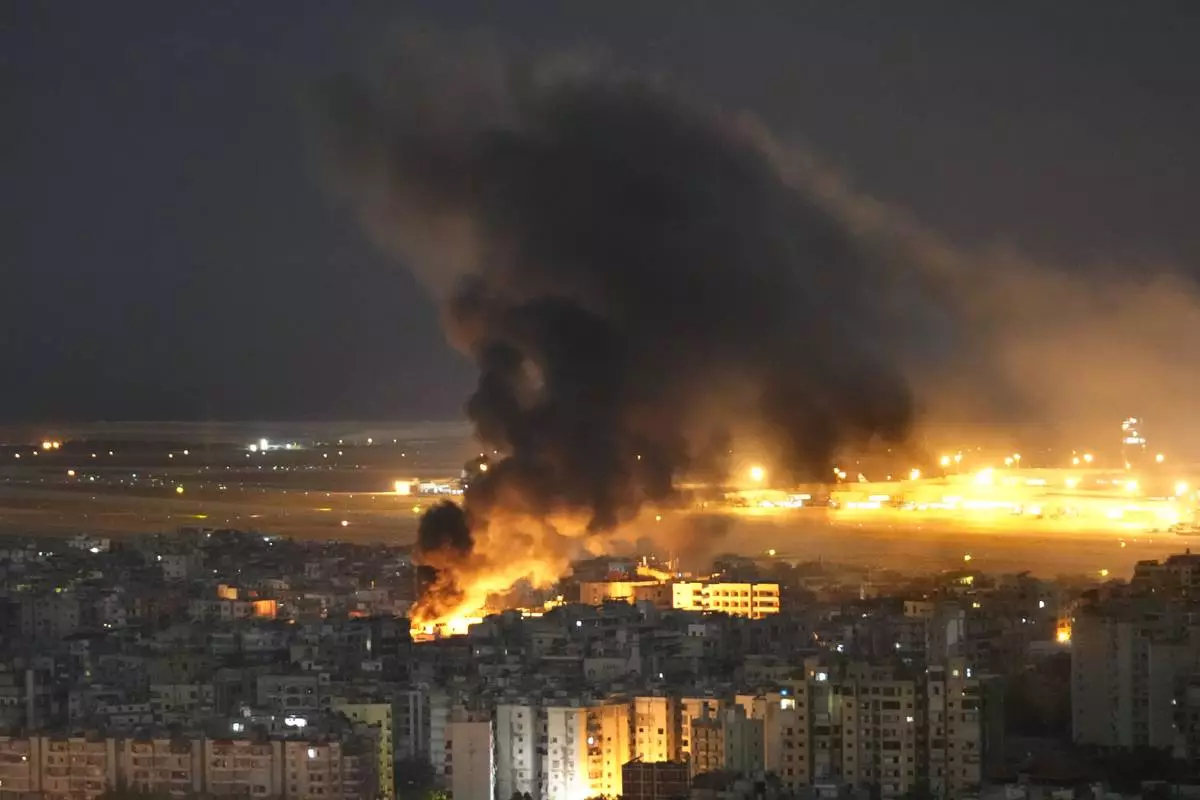
Flames and smoke rise form an Israeli airstrike on Dahiyeh, in the southern suburb of Beirut, Lebanon, Sunday, Oct. 20, 2024. (AP Photo/Hussein Malla)
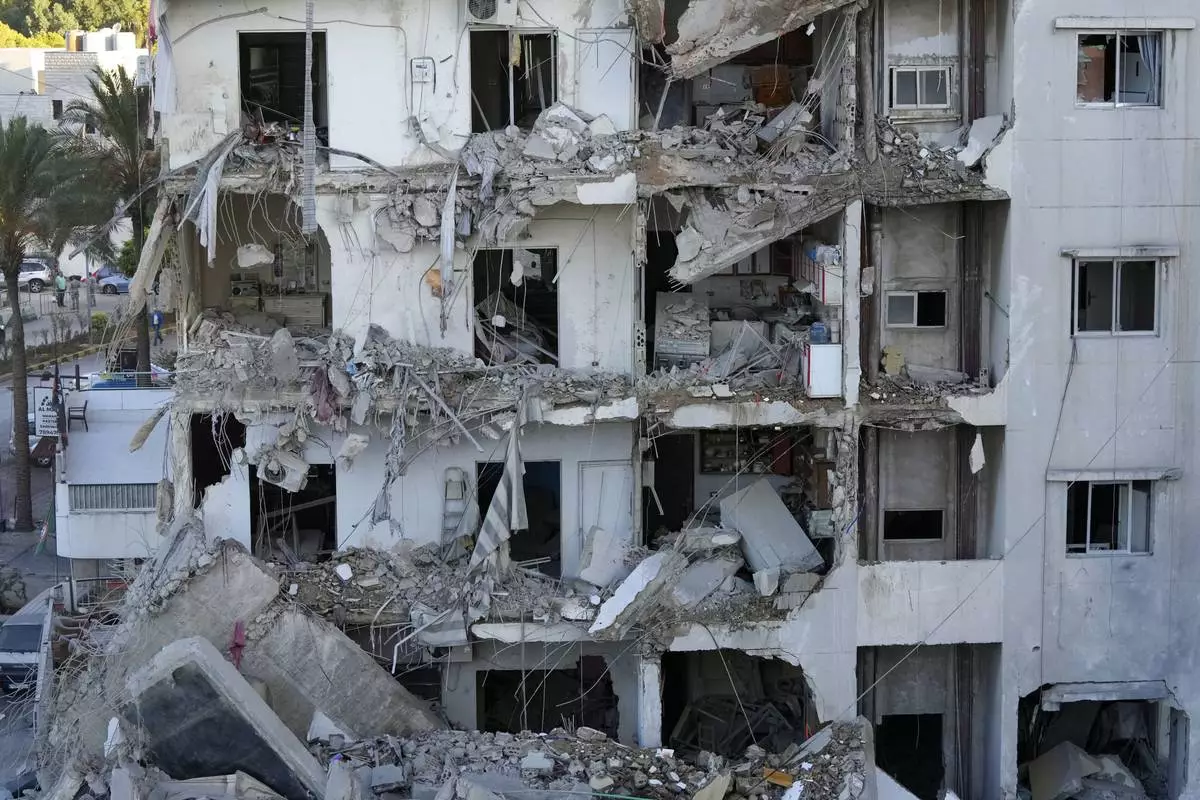
A destroyed apartment at the site of an Israeli airstrike in Dahiyeh, Beirut, Lebanon, Monday, Oct. 21, 2024. (AP Photo/Hassan Ammar)
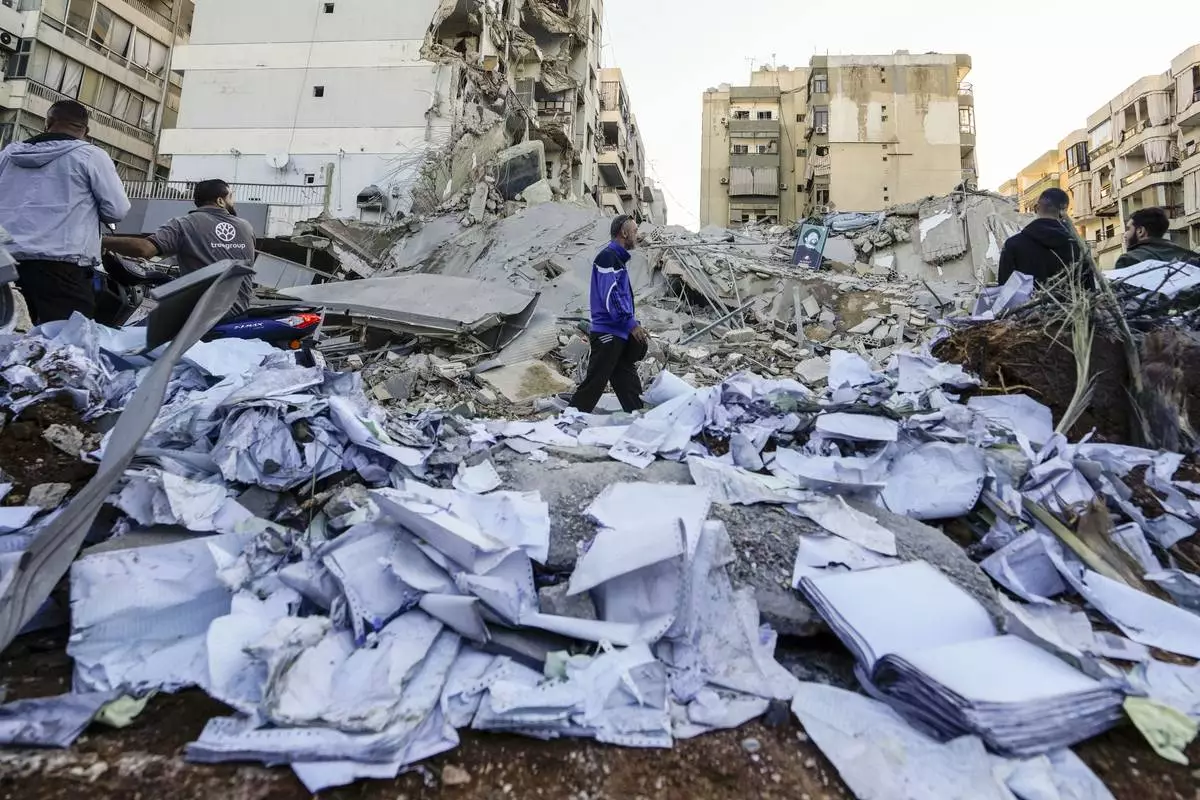
Documents of Hezbollah-run al-Qard al-Hassan are scattered at the site of an Israeli airstrike on Sunday night in Beirut's southern suburb, Lebanon, Monday, Oct. 21, 2024. (AP Photo/Hassan Ammar)



